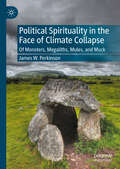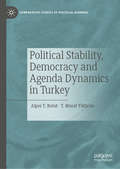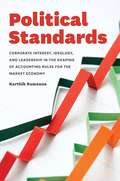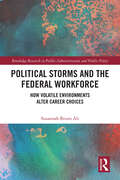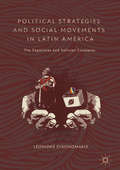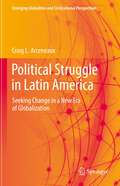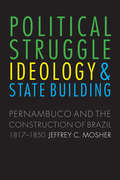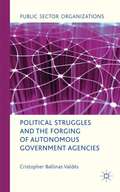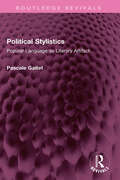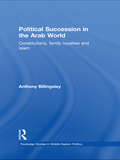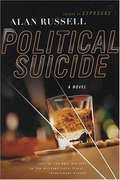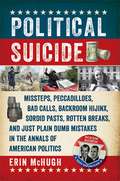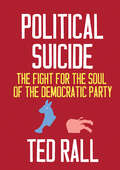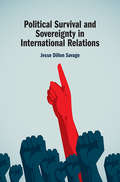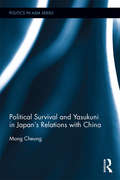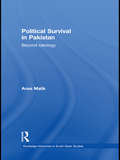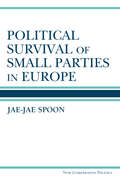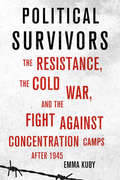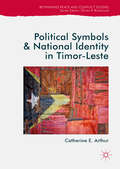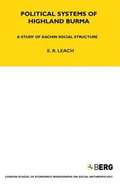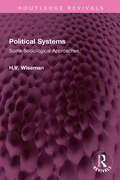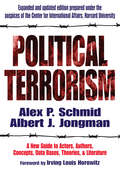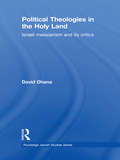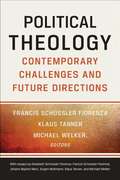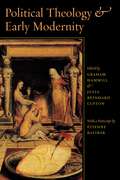- Table View
- List View
Political Spirituality in the Face of Climate Collapse: Of Monsters, Megaliths, Mules, and Muck
by James W. PerkinsonThis book takes its motive force from our contemporary climate crisis. It seeks to reorient human (and especially Christian) understanding, towards a more ecologically-focused, indigenously-informed way-of-living. James W. Perkinson argues that our current eco-climatic and socio-political emergency is the culmination of a 5,000-year history of supremacist “settlement,” in which city-states first emergent in Mesopotamia and Egypt not only begin coercively organizing labor into surplus production and ecosystems into inordinate and destructive yields of “goods,” but in the process, also simultaneously “deform” the Spirit-World “haloing” of natural phenomenon into outsized service of imperial reach. Perkinson recognizes globalized humanity as an emerging monstrosity destroying both human culture and the world. How we re-envision and revalue, at our critical juncture, our inescapable interdependence with the more-than-human world as peer and teacher and even “elder,” is the central theme that throbs below the surface of the very disparate topics commanding attention in each chapter.
Political Stability, Democracy and Agenda Dynamics in Turkey (Comparative Studies of Political Agendas)
by Alper T. Bulut T. Murat YildirimThis book examines the determinants and consequences of policy responsiveness and change, and how policy issues get onto the media and legislative agenda in a transitional democracy. It provides a detailed and attention based theory of Turkish Politics, and develops and introduces comprehensive content-analytics datasets of legislative activities and media coverage that span over several decades.
Political Standards: Corporate Interest, Ideology, and Leadership in the Shaping of Accounting Rules for the Market Economy
by Karthik RamannaPrudent, verifiable, and timely corporate accounting is a bedrock of our modern capitalist system. In recent years, however, the rules that govern corporate accounting have been subtly changed in ways that compromise these core principles, to the detriment of the economy at large. These changes have been driven by the private agendas of certain corporate special interests, aided selectively—and sometimes unwittingly—by arguments from business academia With Political Standards, Karthik Ramanna develops the notion of “thin political markets” to describe a key problem facing technical rule-making in corporate accounting and beyond. When standard-setting boards attempt to regulate the accounting practices of corporations, they must draw on a small pool of qualified experts—but those experts almost always have strong commercial interests in the outcome. Meanwhile, standard setting rarely enjoys much attention from the general public. This absence of accountability, Ramanna argues, allows corporate managers to game the system. In the profit-maximization framework of modern capitalism, the only practicable solution is to reframe managerial norms when participating in thin political markets. Political Standards will be an essential resource for understanding how the rules of the game are set, whom they inevitably favor, and how the process can be changed for a better capitalism.
Political Storms and the Federal Workforce: How Volatile Environments Alter Career Choices (Routledge Research in Public Administration and Public Policy)
by Susannah Bruns AliUnder today’s divisive political rhetoric with direct assaults on agencies and career employees, practitioners and academics need to evaluate the impacts of working in contentious political environments. Encouraging a healthy discourse on what it means to work in a politicized agency, Susannah Bruns Ali uses archival research paired with semi- structured interviews to present a comprehensive view of how political actors and climates influence employee satisfaction and career changes.To understand how the political nature of an organization impacts operations and employees, we must include the volatility or turbulence that the agency operates under. Ali’s approach to examining turnover and turnover intent is novel in incorporating both internal and external organizational factors into an integrative theoretical framework for studying careers of public sector employees. Her analytical focus builds from a theoretical framework to case studies of four agencies within the U.S. Department of Health and Human Services with different responsibilities, task environments, and histories: the Centers for Disease Control and Prevention (CDC), the Centers for Medicare and Medicaid Services (CMS), the Food and Drug Administration (FDA), and the National Institutes of Health (NIH).Political Storms and the Federal Workforce: How Volatile Environments Alter Career Choices unites researchers with careerists to explore how agencies can best sustain morale and performance when elected and appointed officials undermine staff. Understanding what that means for them personally and as managers and leaders will be both engaging and useful moving forward.
Political Strategies and Social Movements in Latin America: The Zapatistas and Bolivian Cocaleros
by Leonidas OikonomakisThis book investigates how social movements form their political strategies in their quest for social change and -when they shift from one strategy to another- why and how that happens. The author creates a model which distinguishes between two different roads to social change: one that passes through the seizure of state power and one that avoids any relationship with the state. Comparing the cases of two Latin American social movements, the Zapatistas in Mexico and the Bolivian Cocaleros, the volume argues that strategic choices are often decided upon through similar mechanisms. Ideal for a scholarly and non-specialist audience interested in Mexican and Bolivian politics, revolutions, and Latin American and social movement studies.
Political Struggle in Latin America: Seeking Change in a New Era of Globalization (Emerging Globalities and Civilizational Perspectives)
by Craig L. ArceneauxThis book discusses in an accessible way how emerging globalizing processes are setting the stage for new forms of social and political struggle in Latin America, with increased involvement of multilateral and foreign actors, and impacts of global political populism and populist social media. These are opening up new strategies and opportunities for activists, and offer new arenas of contestation for international organizations. The book analyzes the struggles of select marginalized groups, specifically the urban poor, indigenous groups, women's and LGBTQ groups, and the vulnerable middle classes. Each case is examined in the context of a distinct struggle for citizenship, identity, inclusion, and or the rule of law. The study offers a broad historical analysis of the region through the context of these struggles. It tackles some of the most pressing issues surrounding the current politics of Latin America, including identity politics, cultural appropriation, social mobilization and protest, neoliberal reform, reproductive rights and sexual autonomy, corruption, the influence of religion and patriarchy, crime and social justice, inequality and poverty, the informal economy, and urban exclusion. In doing so, it details not only how these are not new struggles, but also how they have evolved over time. In the contemporary period, the book explores how the actors as well as character of their struggle are changing through a globalized interchange of ideas and processes. The book covers a wide geographical area in Latin America, with a particular focus on countries with Spanish or Portuguese colonial backgrounds, and is for researchers, students and laypersons interested in new globalizing forces affecting Latin American society and polity.
Political Struggle, Ideology, and State Building: Pernambuco and the Construction of Brazil, 1817-1850
by Prof. Jeffrey Carl MosherThe collapse of the Portuguese empire in the Americas in the early nineteenth century did not immediately or easily translate into the formation of the independent nation-state of Brazil. While “Brazil” had geographic meaning, it did not constitute a cohesive political identity that could draw on basic loyalties. The tumultuous struggle to nationhood in Brazil was marked by the interplay of differing social groups, political parties, and regions. A series of violent revolts in Pernambuco, a large slaveholding, sugar-producing province in northeastern Brazil, exposed the tensions accompanying state and nation building. Political Struggle, Ideology, and State Building delves into the complex and engaging history of the contested province of Pernambuco, providing better understanding of the interplay between local and provincial social and political struggles and the construction of the nation-state. Jeffrey C. Mosher reevaluates political parties, institutions long assumed to be mere facades for elite factions with identical interests. He demonstrates the importance of both formal political institutions and ideology, as well as the efforts of the lower classes to assert their own visions and values. Resentment of the Portuguese provided common ground for some elite factions and lower-class groups and figured importantly in defining the nation. Mosher’s analysis clarifies how the lower class’s assertiveness—in a society sharply divided by slavery, race, and class—frightened various elite groups into embracing both exclusionary discourses on race and the need for authoritarian, centralized political institutions, a development that proved to be an enduring legacy of the period.
Political Struggles and the Forging of Autonomous Government Agencies (Public Sector Organizations)
by Cristopher Ballinas ValdésArgues that autonomous agencies are not the result of a systematic design, but are produced by the interactions of political and bureaucratic forces. The case studies illustrate how political struggles between politicians and bureaucrats can create a muddle of agencies that lack coherence and are subject to conflicting levels of political control.
Political Stylistics: Popular Language as Literary Artifact (Routledge Revivals)
by Pascale GaitetFirst published in 1992, Political Stylistics draws together ideas about society and language from a range of theorists including Pratt, Bourdieu, Goody and Watt, and Bakhtin, to establish a political stylistics: a way of studying the formal properties of texts based on the principle that all linguistic production operates within the intricate network of power relations that structure the social realm. On a practical level, this methodology is used to analyse the representation of popular French and argot in three literary works where it extends beyond the speech of the characters and enters the narrative. The book is articulated along three axes: the trajectory of the French working class from mid-nineteenth century to the mid-twentieth century; the trajectory of popular language from social margin to literary centre; and the evolution of the novel from naturalism to modernism, to post-modernism. This book will be of interest to students of literature, linguistics, literary theory, and cultural studies.
Political Succession in the Arab World: Constitutions, Family Loyalties and Islam (Routledge Studies in Middle Eastern Politics)
by Anthony BillingsleyPolitical succession is a key issue in the contemporary Middle East. In this new study the author examines the process and shows how respect for those in authority and tribal codes of loyalty have been far more influential in maintaining regimes than security institutions and political repression. The Arab world is faced by political turmoil and demands for reform. Many of the problems of the region are attributed to the form of leadership that dominates the area, leadership that is authoritarian and focused on regime survival rather than political change. The book highlights the ways in which family loyalties pervade political, economic and social life and how constitutions are being used to consolidate the power of ruling families in republics and monarchies. The volume explores the notion that the region’s rulers, monarchic and republican, are inclined to pass their power on to their sons, and evaluates the use they make of family and tribal networks to maintain their power. The work sees to demonstrate that despite economic and social problems, Arabs value stability and prefer an authoritarian family-based regime than government run by Islamist groups. Providing new insights into the influences on political succession in the Middle East, this work will be of great interests to scholars of Middle East studies, history and international relations.
Political Suicide
by Alan RussellWill Travis, a small-time investigator, unwittingly foils a murder attempt on a politician's daughter and finds himself in a much bigger case.
Political Suicide: Missteps, Peccadilloes, Bad Calls, Backroom Hijinx, Sordid Pasts, Rotten Breaks, and Just Plain Dumb Mistakes in the Annals of American Politics
by Erin MchughA collection of entertaining and cautionary tales of political missteps in American history, from the birth of the nation through the present day. Just in time for the presidential election of 2016 comes Political Suicide, a history of the best and most interesting missteps, peccadilloes, bad calls, back room hijinks, sordid pasts, rotten breaks, and just plain dumb mistakes in the annals of American politics. They have tweeted their private parts to women they're trying to impress. They have gotten caught on tape doing and saying things they really shouldn't have. They have denied knowing about the underhanded doings of underlings -- only to have a paper trail lead straight back to them. Nowadays, it seems like half of what we hear about politicians isn't about laws or governing, but is instead coverage focused on shenanigans, questionable morals, and scandals too numerous to count. And while we shake our heads in disbelief, we still can't resist poring over the details of these notorious incidents. In Political Suicide, the foibles of our politicians are brought from the tabloid pages to this entertaining -- and cautionary -- tale of American history.
Political Suicide: The Fight for the Soul of the Democratic Party
by Ted RallTed Rall's latest is a no-holds-barred look at the civil war raging within the Democratic Party in the graphic style of his national bestseller, Bernie.There's a split in the Democratic Party. Progressives are surging with ideas and candidates like Bernie Sanders, Elizabeth Warren and Alexandria Ocasio-Cortez. 72 percent of Democratic voters are progressives. But centrists like Tom Perez and the Clintons still run the DNC party apparatus--and they don't want to compromise. Intraparty warfare exploded into the open in 2016. It's even bigger now. The struggle goes back decades, to the New Left and the election of Richard Nixon over George McGovern. It continued with the Democratic establishment's quashing of insurgent progressives like Jesse Jackson, Ralph Nader and Howard Dean. The vast scale of the DNC's secret conspiracy to stop Bernie Sanders in 2016 nomination came out courtesy of WikiLeaks. Will Democrats again become the party of the working person? Or will the corporatists win and continue their domination of electoral politics? Ted Rall gets to the bottom of the story neither the Democrats nor the Republicans want you to know: how the civil war in the Democratic Party poses an existential threat to the two-party system.
Political Survival and Sovereignty in International Relations
by Jesse Dillon SavageWhy do political actors willingly give up sovereignty to another state, or choose to resist, sometimes to the point of violence? Jesse Dillon Savage demonstrates the role that domestic politics plays in the formation of international hierarchies, and shows that when there are high levels of rent-seeking and political competition within the subordinate state, elites within this state become more prepared to accept hierarchy. In such an environment, members of society at large are also more likely to support the surrender of sovereignty. Empirically rich, the book adopts a comparative historical approach with an emphasis on Russian attempts to establish hierarchy in post-Soviet space, particularly in Georgia and Ukraine. This emphasis on Post Soviet hierarchy is complemented by a cross-national statistical study of hierarchy in the post WWII era, and three historical case studies examining European informal empire in the 19th and early 20th centuries.
Political Survival and Yasukuni in Japan's Relations with China (Politics in Asia)
by Mong CheungWhat role does the political survival of prime ministers play in Japan’s relations with China over the Yasukuni issue? Three Japanese prime ministers, including Nakasone Yasuhiro, Hashimoto Ryutaro and Abe Shinzo, complied with China’s demands and stopped visiting the controversial Shrine in 1986, 1997 and 2007, respectively. By contrast, the Yasukuni controversy intensified between 2001 and 2006 when a popular Prime Minister Koizumi Junichiro was determined to pay regular homage to the Yasukuni Shrine annually. Prime Minister Abe, who previously demonstrated restraint over the issue in his first term between 2006 and 2007, visited the Yasukuni unexpectedly in 2013 but not in 2014 or 2015. To explain this variation, this book presents an alternative interpretation of Japan’s official responses toward China’s pressure over the Yasukuni issue between 1985 and 2015 by applying a political survival approach that highlights the domestic political legitimacy of the Japanese prime minister or the ruling party. This book will be of great interest to students and researchers of Sino-Japanese relations, Japan’s foreign policy and international relations.
Political Survival in Pakistan: Beyond Ideology (Routledge Advances in South Asian Studies)
by Anas MalikPresenting a framework that incorporates macro-level forces into micro-level strategic calculations, this book explains key political choices by leaders and challengers in Pakistan through the political survival mechanism. It offers an explanation for continuing polity weakness in the country, and describes how political survival shapes the choices made by the leaders and challengers. Using a unique analysis that synthesizes theories of weak states, quasi-states and political survival, the book extends beyond rationalist accounts and the application of choice-theoretical approaches to developing countries. It challenges the focus on ideology and suggests that diverse, religiously and ethnically-defined affinity groups have interests that are represented in particular ways in weak state circumstances. Extensive interviews with decision-makers and polity-participants, combined with narrative accounts, allow the author to examine decision-making by leaders in a state bureaucratic machinery context as well as the complex mechanisms by which dissident affinity groups may support ‘quasi-state’ options. This study can be used for comparisons in Islamic contexts, and presents an interesting contribution to studies on South Asia as well as Political Development.
Political Survival of Small Parties in Europe
by Spoon Jae-Jae"Engagingly written and employing a fruitful mix of comparative research methods, this book explains how and why small parties, while they may not be entirely masters of their own fate, are more than simply corks tossed on the ocean. It adds significantly to our understanding, and deserves to be widely read. " ---Tim Bale, University of Sussex, UK "Spoon uses innovative methods for examining the effect of green party behavior on their electoral fortunes, electoral presence, and visibility to the public . . . This book makes an important contribution to the fields of niche party fortunes, party politics, and comparative politics in general. " ---Bonnie Meguid, University of Rochester "Political Survival of Small Parties in Europeoffers the rare treat of a small-n comparison that engages with broad political science issues of small party flair, feat, and fate. Mixed methods means that the depth of knowledge about individual cases is balanced with a theoretical ambition. In contrast with many other approaches, Spoon demonstrates the agency of small parties in adapting and using the constraints of their political and institutional environments. " ---Florence Faucher, Sciences Po---Centre d'études européennes, France It is often thought that small party survival or failure is a result of institutional constraints, the behavior of large parties, and the choices of individual politicians. Jae-Jae Spoon, in contrast, argues that the decisions made by small parties themselves determine their ability to balance the dual goals of remaining true to their ideals while maximizing their vote and seat shares, thereby enabling them to survive even in adverse electoral systems. Spoon employs a mixed-methods approach in order to explore the policy, electoral, and communication strategies of West European green parties from 1980 to the present. She combines cross-national data on these parties with in-depth comparative case studies of two New Politics parties, the French and British green parties, that have survived in similar national-level plurality electoral systems. Both of these green parties have developed as organizations and now run candidates in elections at the local, national, and European levels in their respective countries. The parties' survival, Spoon asserts, results from their ability to balance their competing electoral, policy, and communication goals. Jacket design: Heidi Hobde Dailey
Political Survivors: The Resistance, the Cold War, and the Fight against Concentration Camps after 1945
by Emma KubyIn 1949, as Cold War tensions in Europe mounted, French intellectual and former Buchenwald inmate David Rousset called upon fellow concentration camp survivors to denounce the Soviet Gulag as a "hallucinatory repetition" of Nazi Germany's most terrible crime. In Political Survivors, Emma Kuby tells the riveting story of what followed his appeal, as prominent members of the wartime Resistance from throughout Western Europe united to campaign against the continued existence of inhumane internment systems around the world. The International Commission against the Concentration Camp Regime brought together those originally deported for acts of anti-Nazi political activity who believed that their unlikely survival incurred a duty to bear witness for other victims. Over the course of the next decade, these pioneering activists crusaded to expose political imprisonment, forced labor, and other crimes against humanity in Franco's Spain, Maoist China, French Algeria, and beyond. Until now, the CIA's secret funding of Rousset's movement has remained in the shadows. Kuby reveals this clandestine arrangement between European camp survivors and American intelligence agents. She also brings to light how Jewish Holocaust victims were systematically excluded from Commission membership – a choice that fueled the group's rise, but also helped lead to its premature downfall. The history that she unearths provides a striking new vision of how wartime memory shaped European intellectual life and ideological struggle after 1945, showing that the key lessons Western Europeans drew from the war centered on "the camp," imagined first and foremost as a site of political repression rather than ethnic genocide. Political Survivors argues that Cold War dogma and acrimony, tied to a distorted understanding of WWII's chief atrocities, overshadowed the humanitarian possibilities of the nascent anti-concentration camp movement as Europe confronted the violent decolonizing struggles of the 1950s.
Political Symbols and National Identity in Timor-Leste (Rethinking Peace and Conflict Studies)
by Catherine E. ArthurThis book explores how national identity has been negotiated and (re)imagined through the political symbols that embody it in post-conflict Timor-Leste. It develops a Modernist approach to nations and nationalism by incorporating Bourdieusian theories of symbolic capital and conflict, to examine how national identity has been constructed and represented in political symbols. Taking case studies of flags, monuments, national heroes, and street art, it critically analyses how a diverse population has interpreted and (re)constructed its national identity throughout the first decade of independence, and how the transition from a context of conflict to peace has influenced such popular imaginings. By examining these processes of identification with a wide range of symbols, the book discusses the numerous challenges that this young nation-state still faces, including victimhood and recognition, democratization and electoral politics, the political role of cosmology and spirituality, and post-colonial generational differences and divisions.
Political Systems of Highland Burma: A Study of Kachin Social Structure
by E. R. LeachA modern type of sociological analysis has been applied to the rich ethnographical material of northern Southeast Asia. It constitutes an outstanding development in the field of anthropological theory. (LONDON SCHOOL OF ECONOMICS MONOGRAPHS ON SOCIAL ANTHROPOLOGY: Volume 44)
Political Systems: Some Sociological Approaches (Routledge Revivals)
by H WISEMANFirst published in 1966, Political Systems provides an examination of political systems through a sociological approach. This comprehensive survey summarizes the theories of many of the most eminent and influential political scientists- Gabriel Almond, David Easton, Edward Shils, Seymour M. Lipset, Harry M. Johnson, T.B. Bottomore, James S. Coleman, Leonard Binder, Robert K. Merton, David Apter, to name a few.Beginning with the description of general concepts, Mr. Wiseman discusses political culture and the typologies of political systems; this is followed by a methodical examination of political systems, analyzed from a wide range of sociological aspects. An appraisal of political systems from the standpoint of economic and social development then leads to a final section devoted to a study of structural functional analysis. Authoritative, thorough, well documented and conveying complex theories with a clarity for which every reader will be grateful. This is a must read for students and scholars of political science, political sociology and sociology.
Political Terrorism: A New Guide to Actors, Authors, Concepts, Data Bases, Theories, and Literature
by A.J. JongmanWhile there is no easy way to define terrorism, it may generally be viewed as a method of violence in which civilians are targeted with the objective of forcing a perceived enemy into submission by creating fear, demoralization, and political friction in the population under attack. At one time a marginal field of study in the social sciences, terrorism is now very much in center stage. The 1970s terrorist attacks by the PLO, the Provisional Irish Republican Army, the Popular Front for the Liberation of Palestine, the Japanese Red Army, the Unabomber, Aum Shinrikyo, Timothy McVeigh, the World Trade Center attacks, the assault on a school in Russia, and suicide bombers have all made the term terrorism an all-too-common part of our vocabulary.This edition of Political Terrorism was originally published in the 1980s, well before some of the horrific events noted above. This monumental collection of definitions, conceptual frameworks, paradigmatic formulations, and bibliographic sources is being reissued in paperback now as a resource for the expanding community of researchers on the subject of terrorism. This is a carefully constructed guide to one of the most urgent issues of the world today.When the first edition was originally published, Choice noted, This extremely useful reference tool should be part of any serious social science collection. Chronicles of Culture called it a tremendously comprehensive book about a subject that any who have anything to lose--from property to liberty, life to limbs--should be forewarned against.
Political Theologies in the Holy Land: Israeli Messianism and its Critics (Routledge Jewish Studies Series)
by David OhanaThis book examines the role of messianism in Zionist ideology, from the birth of the Zionist movement through to the present. Is shows how messianism is not just a religious or philosophical term but a very tangible political practice and theology which has shaped Israeli identity. The author explores key issues such as: the current presence of messianism in the Israeli public sphere and the debates with jewish settlers in the occupied territories after the 1967 war the difference between transcendental messianism and promethean messianism the disparity between the political ideology and political practice in the history of Israel the evolution of the messianic idea in the actions of David Ben-Gurion the debate between Martin Buber, Gershom Scholem, Isaiah Leibowitz, J. L. Talmon and other intellectual figures with Ben-Gurion the implications of political theology and the presence of messianic ideas in Israeli politics As the first book to examine the messianism in Israeli debate since the creation of the Israeli state, it will be particularly relevant for students and scholars of Political Science, modern intellectual history, Israel studies, Judaism and messianism.
Political Theology
by Michael Welker Francis Schüssler Fiorenza Klaus TannerIn this collection, six leading theologians on political theology explore the contemporary states and potential future of the discipline. Offering a highly nuanced and complex picture of "older" and "newer" Political Theology, these scholars examine the multifaceted interconnections and tensions between political theologies, liberation theologies, feminist theologies, and theologies that see themselves as "postcolonial" or "decolonizing. " Among other topics, the authors address the ecumenical and global nature of political theology; the lack of critical feminist analysis in most political, liberation, and postcolonial theologies; the statements regarding political theology in the encyclicals of Benedict XVI; and the specific tasks that political theology must address to remain effective and relevant. Contributors include Jürgen Moltmann, Johann Baptist Metz , Elisabeth Schüssler Fiorenza, Francis Schüssler Fiorenza, Klaus Tanner, and Michael Welker.
Political Theology & Early Modernity
by Étienne BalibarPolitical theology is a distinctly modern problem, one that takes shape in some of the most important theoretical writings of the twentieth and twenty-first centuries. But its origins stem from the early modern period, in medieval iconographies of sacred kinship and the critique of traditional sovereignty mounted by Hobbes and Spinoza. In this book, Graham Hammill and Julia Reinhard Lupton assemble established and emerging scholars in early modern studies to examine the role played by sixteenth- and seventeenth-century literature and thought in modern conceptions of political theology. Political Theology and Early Modernity explores texts by Shakespeare, Machiavelli, Milton, and others that have served as points of departure for such thinkers as Schmitt, Strauss, Benjamin, and Arendt. Written from a spectrum of positions ranging from renewed defenses of secularism to attempts to reconceive the religious character of collective life and literary experience, these essays probe moments of productive conflict, disavowal, and entanglement in politics and religion as they pass between early modern and modern scenes of thought. This stimulating collection is the first to answer not only how Renaissance and baroque literature help explain the persistence of political theology in modernity and postmodernity, but also how the reemergence of political theology as an intellectual and political problem deepens our understanding of the early modern period.
